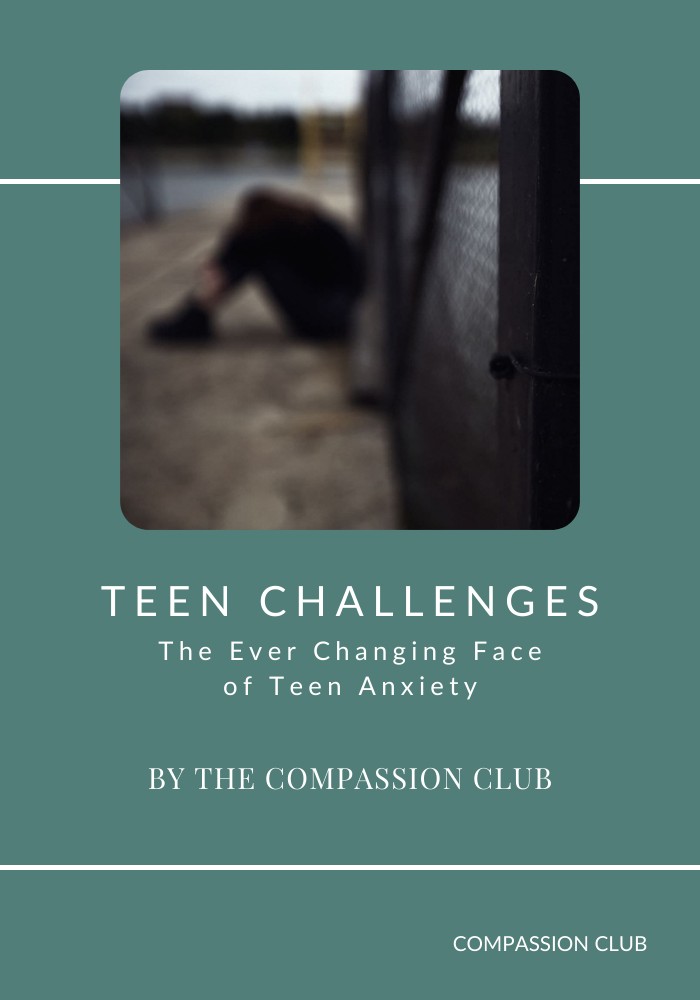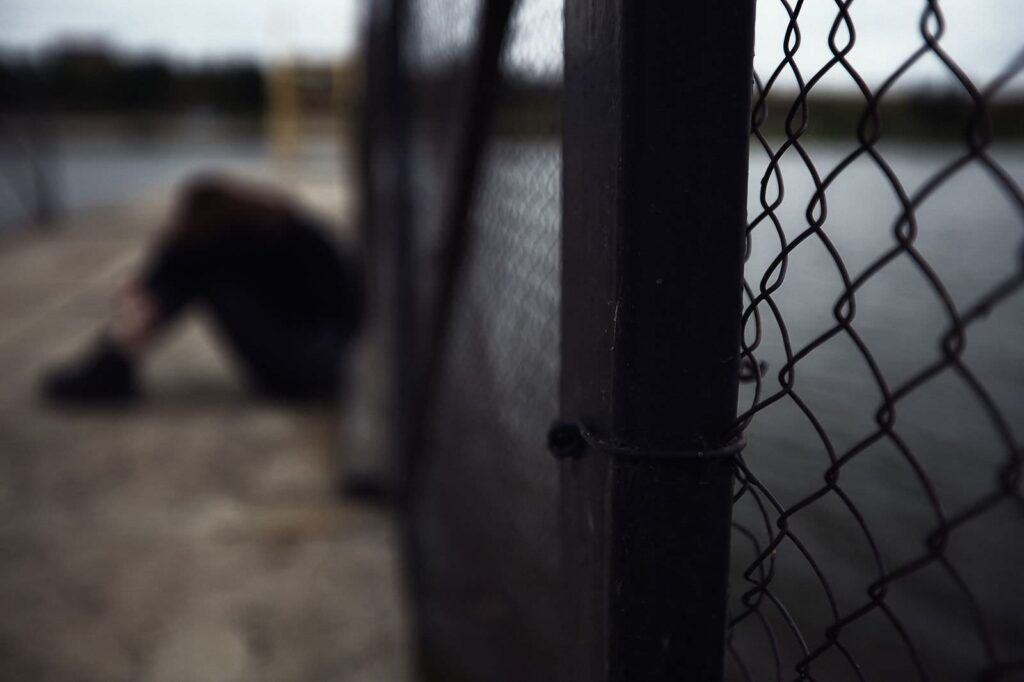THE COMPASSION CLUB
TEEN CHALLENGES: The Ever Changing Face of Teen Anxiety

My sister is something of an emotional unicorn.
She rarely experiences anxiety, at least the kind that is common for so many people. She has never had an anxiety attack, she faces new challenges with confidence and strength, she doesn’t get nervous in stressful situations, she is rarely flustered or emotional when faced with other people’s volatility or when confronted. The only things that scare her are haunted houses and mice.
My niece, her daughter, does experience anxiety on a regular basis. She has panic attacks, is emotional and pulls out her eyelashes ( she was diagnosed with Trichotillomania at age 5, she is now in her twenties). The poor girl is more like me in those ways.
Imagine how hard it is for my sister to understand and comprehend what her daughter suffers through so regularly.
Mothers want to shield our kids from pain, but when it is completely foreign to you as to why your child is melting down over what you consider is nothing, it’s frustrating. Often times, you start by asking “Is everything ok?” And then you find yourself shouting, “What is wrong with you?!?” Until both the kids and parents can acknowledge that they have anxiety, that it is not just emotional, but physiological, they will both be hitting their heads against the wall in frustration.
It’s pretty easy to recognize when a baby or small child is nervous, anxious. They cry, they cling to their parent or blanket, they hide behind the leg of someone they trust. And, it’s pretty easy to console that reaction when the child meets a new person, sees a scary animal, is in a new situation. We tell them that it’s okay, they are safe, we wouldn’t let anything bad happen to them. We do whatever it takes to ease their anxiety.
As kids get older, say from 8 or 9 and up, it’s not as easy to recognize nervousness, or anxiousness.
Some kids may still recoil behind their parent, or fall back to observe before going into a new situation. However, a lot of kids start acting out when they are anxious. The older they get, the further away so many of them move from those obvious reactions.
With little children, we may become a little frustrated or embarrassed when they act nervous, shy, timid. But, we also, typically, ask what is wrong, what are they afraid of. We reassure them, we comfort them. As kids grow into teens, our embarrassment and frustration are often the reaction we have to their behavior. We don’t ask what is wrong, what is bothering them. We aren’t recognizing it as anxiety; we see it as rebellion, disobedience, disrespect.
Anxiety can be debilitating.
However, it can also lead someone to turn to drugs, alcohol or promiscuity to attempt to numb the fear. When you combine puberty and perpetual anxiety, that can overwhelm everybody involved: the kids, parents, teachers, siblings.
An article in the El Paso Times states:
“The most common mental illnesses among young people are anxiety and depression, according to the National Institutes of Mental Health.”
“One-in-five children age 13-18 have or will have mental illness, according to the National Alliance on Mental Illness. But on average, it takes eight to ten years after the onset of mental illness to receive treatment.”
There are many signs that a teen is suffering from anxiety. Here are 6 hidden signs of anxiety in teens from an article on psycom.net:
6 Hidden Signs of Teen Anxiety
Article by:
Katie Hurley, LCSW
Emotional changes
While some anxious teens express feelings of pervasive worry, others experience subtle emotional changes such as:
• Feeling “keyed up”
• Feeling on edge
• Irritability
• Difficulty concentrating
• Restlessness
• Unexplained outbursts
Social changes
Anxiety can negatively affect friendships. If your once social teen suddenly avoids his favorite activities or stops making plans with friends, think twice. You might notice your child:
• Avoiding social interactions with usual friends
• Avoiding extracurricular activities
• Isolating from peer group
• Spending increased time alone
Physical changes
Watch for these common psychosomatic complaints:
• Frequent headaches, including migraines
• Gastrointestinal problems
• Unexplained aches and pains
• Excessive fatigue
• Complaints of not feeling well with no obvious medical cause
• Changes in eating habits.
Sleep disturbance
• Difficulty falling asleep
• Difficulty staying asleep
• Frequent nightmares
• Not feeling refreshed after sleep
Poor school performance
• Significant jump in grades (usually downward)
• Frequently missed assignments
• Describes feeling overwhelmed by workload
• Procrastinates on, or has difficulty concentrating on, homework assignments more than usual
Symptoms of panic attacks
Not all anxious teens experience panic attacks, and some experience mild symptoms of panic without enduring a full panic attack. The following symptoms are common among people with anxiety disorders:
• Rapid heartbeat
• Sweating and trembling
• Dizziness
• Upset stomach
• Difficulty breathing
• Chest pain
• Feeling like they’re dying
• Feeling like they’re “going crazy”
• Numbness or tingling in arms and legs
• Derealization
As much as we want, expect, our teens to know better, do better, be better, we have to remember that they still need us to ask them if they’re ok.
We need to check on them, comfort them, wrap our arms around them and tell them that you are in this together. That could be all they need, the knowledge that, even if you don’t “get it,” you are there for them. It may take therapy and/or medications to get them over the first, big hurtle. Whatever they need, to know that you are their champion, their advocate, their safe place can make all difference. Remind them that they will always be your baby.
MEET THE BLOGGER

The Compassion Club: A Place to Connect and Make a Difference
Welcome to the Compassion Club, your online community for connecting with like-minded individuals who share a passion for making a positive impact in the world. Whether you are already involved in volunteer work or looking for ways to get involved, our club is here to support and empower you on your journey towards creating a kinder and more compassionate society.
Founded on the belief that even small acts of kindness can create significant change, the Compassion Club is dedicated to promoting empathy, understanding, and love through various initiatives and projects. Our goal is to inspire others to spread compassion in their everyday lives and make a difference in their communities.